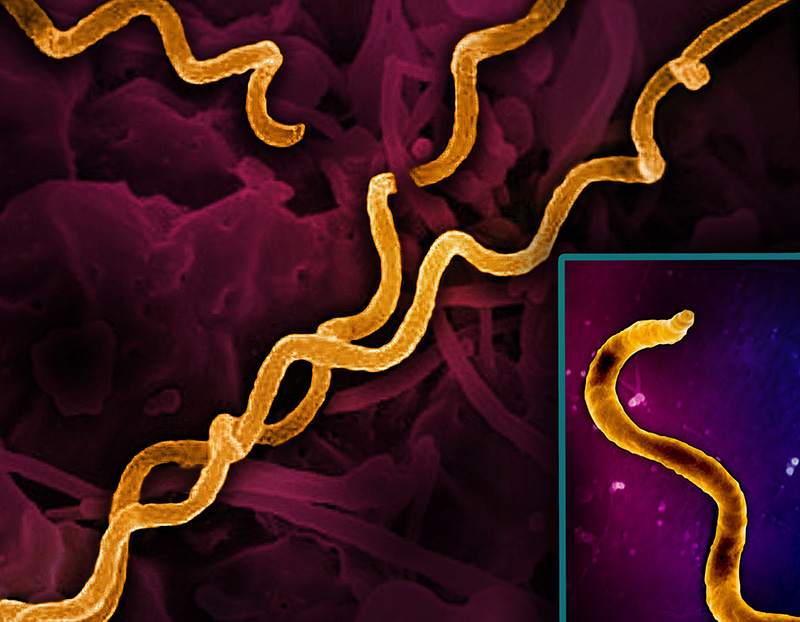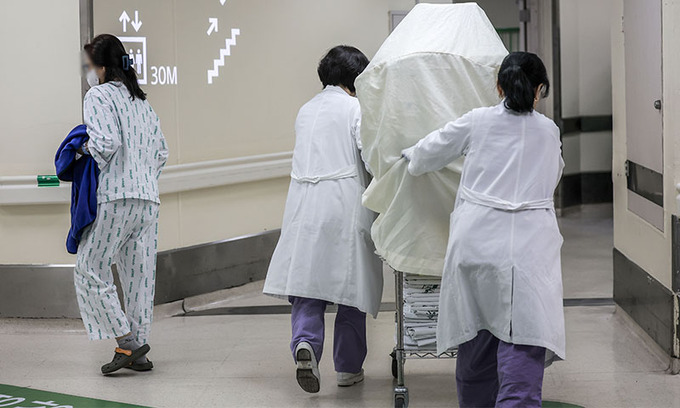
Press release
Tuesday September 3, 2024
Simplifying the screening process to speed up public health responses

Treponema Pallidum bacteria, which causes syphilis. Includes a close-up foreground of a particle. Gold is used to stain the spiral-shaped bacteria. NIAID
Ten projects were funded by the National Institute of Allergy and Infectious Diseases of the National Institutes of Health (NIAID). Diagnostic tools Congenital and adult syphilis are currently diagnosed by a series of tests that have limited accuracy. According to the Centers for Disease Control and Prevention, adult and congenital syphilis increased by 80 % and 183 % respectively between 2018 and 2020. This crisis prompted the U.S. Department of Health and Human Services. Create a national working group Responding to epidemics.
“Antibiotics for syphilis are effective, but outdated tests make it difficult to ensure patients receive the correct diagnosis and treatment,” said NIAID Director Jeanne M. Marrazzo, MD. “Advanced diagnostics would simplify syphilis treatment and improve our ability to evaluate syphilis vaccine candidates and other prevention methods.”
Syphilis, a sexually transmitted infection caused by the bacteria Treponema pallidum. The disease can cause neurological and organ damage in adults as well as birth defects, neonatal death, and congenital anomalies. According to the CDC, syphilis cases in the United States have increased significantly since 2000. This is mainly due to a dramatic increase in cases that began in 2019.
Current syphilis tests require at least two antibody-based tests that are decades old. They are unable to distinguish between antibodies from an active or resolved infection. These tests cannot consistently confirm whether antibiotics have cleared the infection. T. pallidum Bacteria are eliminated from the human body. Modern molecular diagnostic techniques such as nucleic acid amplification platforms and systems that detect fragments of a pathogen are used for the diagnosis of other infectious diseases. They could also be applied to syphilis.
These grants will explore a broad range of concepts in immunology and diagnostics, such as basic research into childhood immunity to syphilis or new diagnostic tests to identify the different parts T. pallidum Measurements of antimicrobial resistance and genomic material in infants, adults and children T. pallidum Strains and testing platforms that can be used at the point of care rather than in an external laboratory. The grants, totaling $2.4 million, are distributed among the recipients as follows:
Magic Lifescience, Inc., Mountain View, California
Project Title: Development of a Novel Molecular Diagnostic Test for Multiplexed Panel Testing of Genital Ulcers on Giant Magnetic Biosensors
Elaine Ng (Ph.D.) is the principal investigator.early career researcher)
Grant: 1 R21 AI185972-01
Nationwide Children's Hospital, Columbus, Ohio
Project Title: Interrogation of infant immune responses for the diagnosis of congenital syphilis infection
Principal Investigator: Masako Shimamura, MD
Grant: 1 R21 AI186003-01
University of California, San Francisco
Project Title: Novel biomarkers to diagnose syphilis during pregnancy and assess treatment response using multi-omics approaches
Principal Investigator: Stephanie Gaw, MD, Ph.D.
Grant: 1 R21AI186006-01
University of Texas at Austin
Project Title: Improving the diagnosis of maternal and congenital syphilis using a triadic approach
Sanchita Bhadra, Ph.D. Principal Investigator (Early Career Investigator), with Randolph Hubach, Ph.D. (Purdue University)
Grant: 1 R21 AI185965-01
University of Texas Southwestern Medical Center in Dallas
Project Title: Pre-analytical Factors Affecting Molecular Testing for Congenital Syphilis
Principal Investigator: Jeffrey Sorelle, MD Emily Adhikari MD
Grant: 1 R21 AI185968-01
University of Victoria in British Columbia (Canada)
Project Title: Development of a diagnostic test that can be used to diagnose infectious and congenital syphilis
Principal Investigator: Caroline Cameron, Ph.D.
Grant: 1 R21 AI186005-01
University of Washington Seattle
Project Title: Rapid and Ultrasensitive Aptamer-Based Detection Technologies for T. pallidum Stephen Salipante MD Ph.D.
Grant: 1 R21 AI184484-01
University of Washington Seattle
Project Title: Rapid Point-of-Care Detection of T. pallidum Resistance to macrolides by loop-mediated multiplex amplification
Principal Investigator: Joshua Lieberman, MD, Ph.D. (Early Phase Investigator)
Grant: 1 R21 AI184749-01
University of Washington Seattle
Project Title: Treponema pallidum sensitive Genome recovery by mosaic amplicon sequencing Principal Investigator: Alexander Greninger, MD, Ph.D., MS, M.Phil.
Grant: 1 R21 AI185726-01
Virginia Polytechnic Institute and State University (Blacksburg)
Project Title: Released Peptidoglycan Fractions as a Biomarker of Early Stages of Syphilis
Principal Investigator: Brandon Jutras, Ph.D.
Grant: 1 R21 AI185998-01
NIAID supports and conducts research at NIH, in the United States, and around the world to study and develop new methods for diagnosing, preventing, and treating infectious and immune-related diseases. On the NIAID website, you can find news releases, fact sheets, and other NIAID materials.
NIAID website .The National Institutes of Health:
The NIH is the medical research agency of the U.S. Department of Health and Human Services. It includes 27 institutes and centers. The NIH, the nation's medical research agency, is a component of the U.S. Department of Health and Human Services. It is responsible for conducting basic, translational, and clinical medical research and investigating causes, treatments, and cures. Visit the NIH for more information about its programs and services. www.nih.gov .NIH…Making Discovery Into Healthy Living
(r)###
